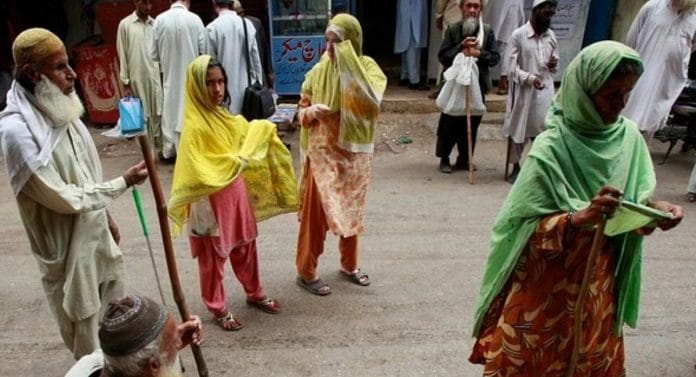New Delhi: The Pakistan government has a new menace that is hurting its image globally—citizens posing as beggars in foreign countries. The country has now decided to suspend the passports of 2,000 ‘beggars’, who go to countries like Saudi Arabia, Iraq, and Iran in the garb of performing religious activities and pilgrimage. The government has issued a seven-year ban on such passports, adding that this practice brings disrepute to the country.
The government has collected data on individuals traveling abroad to beg on the streets and the Ministry of Interior and the Ministry of External Affairs are finalising a coordinated policy on this matter, Dawn reported on 6 July.
Last September, the Ministry of Overseas Pakistanis and Human Resource Development informed the Senate Standing Committee on Overseas Pakistanis that an increasing number of Pakistani beggars were being taken abroad, leading to concerns about human trafficking.
Moreover, 90 per cent of the beggars apprehended overseas are of Pakistani origin. Reportedly, Iraqi and Saudi ambassadors have complained that prisons are overcrowded due to these arrests.
The issue has grown to such an extent that countries such as Saudi Arabia and Iraq have urged the Pakistani government to curb the influx of beggars. A significant number of pickpockets apprehended in Mecca’s Grand Mosque in 2023 are also of Pakistani origin.
Also read: Pakistani woman calls out motivational speaker who said on TV that 95% women are ignorant
Profit-making pursuit
According to a policy report published in the Centre for Business and Society in Pakistan, begging thrives in the country due to its profits, which are higher compared to unskilled labour.
Earlier this year, it was reported that 44,000 beggars have been brought back to Pakistan from other countries such as Saudi Arabia in the last two and a half years by the government.
Pakistan has a population of 230 million out of which 38 million are professional beggars with a national average income of PKR 850 every day, Dawn reported. These beggars reportedly receive Rs 32 billion daily in charitable contributions, totaling approximately Rs 117 trillion annually. In dollars, this equates to $42 billion.
“Simply put, these 38 million non-productive individuals are consuming $42 billion, and forcing the rest of the nation to put up with 21 per cent inflation,” Dawn report read.
In Pakistan, visiting shrines and donating to beggars are closely intertwined customs among many Muslims, fostering a “begging mafia” that exploits children.
In 2010, 3,000 children went missing in Karachi alone, as per a BBC report.
According to the Asian Human Rights Commission (AHRC), 2.5 to 11 per cent of the population of Pakistan is choosing to beg to earn a living. About 1.2 million children roam the streets of major urban centers in the country, Express Tribune reported.
Officials from the Ministry of Overseas Pakistanis suggested to the government that the National Database and Registration Authority (NADRA) block the Computerized National Identity Card (CNIC)’s of individuals engaged in begging to dismantle the nexus. The committee chairperson, Senator Engr. Rukhsana Zuberi, noted that Pakistan has a high youth unemployment rate of 60 per cent and emphasised the urgent need for employment opportunities.
Zuberi advocated for concise training programmes in medical fields like nursing, and midwifery to combat unemployment. He also recommended establishing an online portal to provide real-time information on job opportunities abroad, including required skills and training institutions. He suggested collaboration with the Information Technology Ministry and Pakistan Information Technology Board for its implementation.






